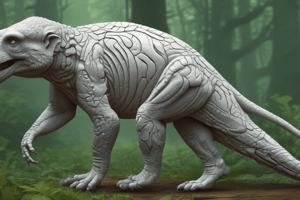Podcast
Questions and Answers
What was the outcome of Darwin's analysis of the plants and animals he gathered?
What was the outcome of Darwin's analysis of the plants and animals he gathered?
- He developed a theory of natural selection. (correct)
- He disproved the theory of evolution.
- He created a new classification system for animals.
- He discovered a new species of plant.
What was the main idea behind Darwin's theory of natural selection?
What was the main idea behind Darwin's theory of natural selection?
- All living organisms have a fixed, unchanging characteristics.
- The Earth's surface is shaped by sudden catastrophic events.
- Species change over time due to genetic mutations.
- Traits that are best suited to an environment are more likely to be passed on. (correct)
What was the title of the book published by Darwin in 1859?
What was the title of the book published by Darwin in 1859?
- On the Origin of Species (correct)
- The Theory of Natural Selection
- The Evolution of Species
- The Changing Earth
What was the age of Charles Darwin when he died?
What was the age of Charles Darwin when he died?
Where is Charles Darwin buried?
Where is Charles Darwin buried?
What is the second main idea of Darwin's Big Ideas?
What is the second main idea of Darwin's Big Ideas?
What is the primary mechanism of evolution that Charles Darwin proposed?
What is the primary mechanism of evolution that Charles Darwin proposed?
What occurs within a population of organisms over many generations?
What occurs within a population of organisms over many generations?
Where did Charles Darwin study theology?
Where did Charles Darwin study theology?
What is the main difference between microevolution and macroevolution?
What is the main difference between microevolution and macroevolution?
What did Charles Darwin collect during his voyage on the HMS Beagle?
What did Charles Darwin collect during his voyage on the HMS Beagle?
What is the result of macroevolution?
What is the result of macroevolution?
What was the main purpose of the HMS Beagle's voyage?
What was the main purpose of the HMS Beagle's voyage?
Where was Charles Darwin born?
Where was Charles Darwin born?
Flashcards are hidden until you start studying
Study Notes
Evolution
- Evolution is the change in gene frequency in a population's gene pool over several generations.
- Evolutionary change occurs within a population over many generations, not in individual organisms within their lifetime.
- Evolution occurs in gene pools, not genomes.
- There are two scales of evolution: microevolution (small scale, causing a change in allele frequency) and macroevolution (larger scale, leading to the creation of new species).
Charles Darwin
- Charles Darwin was an English naturalist, biologist, and geologist who proposed the theory of natural selection as a mechanism for evolution.
- He was born in 1809 in Shrewsbury, England, and initially studied medicine at Edinburgh University in Scotland.
- Darwin's passion for natural history led him to focus on it instead of medicine, and he eventually embarked on a voyage aboard the HMS Beagle in 1831.
- During the voyage, Darwin collected numerous samples of plants, animals, rocks, and fossils, which he sent back to England for further study.
- Upon his return, Darwin's work led to groundbreaking scientific discoveries, including the understanding of fossil formation and the shaping of the Earth's surface.
Darwin's Theory of Natural Selection
- The theory of natural selection states that individuals with traits best suited to their environment are more likely to survive and pass on their genes to the next generation.
- This leads to the widespread adoption of such traits in a species and can eventually result in the development of a new species.
- Darwin published his thoughts on evolution and natural selection in On the Origin of Species in 1859.
- The book was popular and controversial, suggesting that the planet was much older than commonly believed at the time.
Darwin's Big Ideas
- Darwin's two main ideas about the change in species over time are the mechanism of natural selection and the concept of common descent.
- The concept of common descent proposes that all organisms alive on Earth today originated from a common ancestor.
Studying That Suits You
Use AI to generate personalized quizzes and flashcards to suit your learning preferences.




